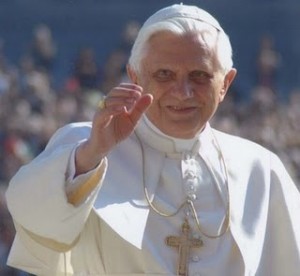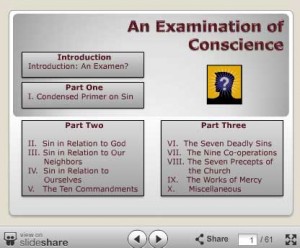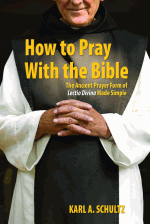“The man in prayer”
Dear brothers and sisters,
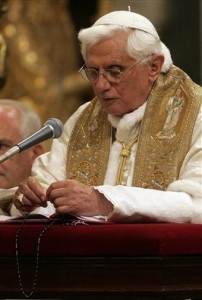 Today I would like to begin a new series of Catecheses. After the series on the Fathers of the Church, on the great theologians of the Middle Ages and on great women, I would now like to choose a topic that is dear to all our hearts: it is the theme of prayer, and especially Christian prayer, the prayer, that is, which Jesus taught and which the Church continues to teach us. It is in fact in Jesus that man becomes able to approach God in the depth and intimacy of the relationship of fatherhood and sonship. Together with the first disciples, let us now turn with humble trust to the Teacher and ask him: “Lord, teach us to pray” (Lk 11:1).
Today I would like to begin a new series of Catecheses. After the series on the Fathers of the Church, on the great theologians of the Middle Ages and on great women, I would now like to choose a topic that is dear to all our hearts: it is the theme of prayer, and especially Christian prayer, the prayer, that is, which Jesus taught and which the Church continues to teach us. It is in fact in Jesus that man becomes able to approach God in the depth and intimacy of the relationship of fatherhood and sonship. Together with the first disciples, let us now turn with humble trust to the Teacher and ask him: “Lord, teach us to pray” (Lk 11:1).
In the upcoming Catechesis, in comparing Sacred Scripture, the great tradition of the Fathers of the Church, of the Teachers of spirituality and of the Liturgy, let us learn to live our relationship with the Lord, even more intensely as it were at a “school of prayer”.
Because we know that prayer can not be taken for granted: we must learn to pray, as if gaining back this art, even those who are very advanced in the spiritual life always feel the need to get to school to learn to Jesus pray with authenticity. We receive the first lesson from the Lord through His example. The Gospels describe Jesus in intimate and ongoing dialogue with the Father is a deep communion of the one who came into the world not to do his will, but the Father who sent him for the salvation of man.
In this first catechesis, as an introduction, I would like to propose some examples of prayer in ancient cultures, as noted, almost always and everywhere have turned to God
I shall start with ancient Egypt, as an example. Here a blind man, asking the divinity to restore his sight, testifies to something universally human. This is a pure and simple prayer of petition by someone who is suffering. This man prays: “My heart longs to see you…. You who made me see the darkness, create light for me, so that I may see you! Bend your beloved face over me” (A. Barucq — F. Daumas, Hymnes et prières de l’Egypte ancienne, Paris 1980). That I may see you; this is the essence of the prayer!
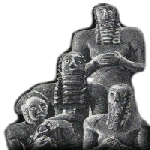 In the religions of Mesopotamia an arcane, paralyzing sense of guilt predominated, but which was not devoid of the hope of redemption and liberation on God’s part. We may thus appreciate this entreaty by a believer of those ancient cultures, formulated in these words: “O God who are indulgent even in the greatest sin, absolve me from my sin…. Look, O Lord at your tired servant and blow your breeze upon him: forgive him without delay. Alleviate your severe punishment. Freed from bonds, grant that I may breathe anew, break my chains, loosen the fetters that bind me” (M.-J. Seux, Hymnes et Prières aux Dieux de Babylone et d’Assyrie, Paris 1976). These are words that demonstrate how the human being, in his search for God, had intuited, if vaguely, on the one hand his own guilt and on the other, aspects of divine mercy and goodness.
In the religions of Mesopotamia an arcane, paralyzing sense of guilt predominated, but which was not devoid of the hope of redemption and liberation on God’s part. We may thus appreciate this entreaty by a believer of those ancient cultures, formulated in these words: “O God who are indulgent even in the greatest sin, absolve me from my sin…. Look, O Lord at your tired servant and blow your breeze upon him: forgive him without delay. Alleviate your severe punishment. Freed from bonds, grant that I may breathe anew, break my chains, loosen the fetters that bind me” (M.-J. Seux, Hymnes et Prières aux Dieux de Babylone et d’Assyrie, Paris 1976). These are words that demonstrate how the human being, in his search for God, had intuited, if vaguely, on the one hand his own guilt and on the other, aspects of divine mercy and goodness.
In the pagan religion of ancient Greece, a very significant development may be seen: prayers, while still invoking divine help to obtain heavenly favours in every circumstance of daily life and to receive material benefits, gradually became orientated to more disinterested requests, which enabled the believer to deepen his or her relationship with God and to become a better person.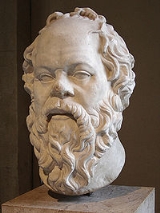
For example, the great philosopher Plato records a prayer of his teacher, Socrates, held to be one of the founders of Western thought. This was Socrates’ prayer: “Grant to me that I be made beautiful in my soul within, and that all external possessions be in harmony with my inner man. May I consider the wise man rich; and may I have such wealth as only the self-restrained man can bear or endure” (Plato, Phaedrus, English trans.: Loeb, Harold North Fowler). Rather than to possess plenty of money, he wanted above all to be beautiful within and wise.
In the Greek tragedies, sublime masterpieces of the literature of all time which still, after 25 centuries, are read, thought about and performed today, there is a content of prayer which expresses the desire to know God and to worship his majesty. One of these tragedies says: “O Earth’s Upbearer, thou whose throne is Earth, Who’er thou be, O past our finding out, Zeus, be thou Nature’s Law, or Mind of man, Thee I invoke; for, treading soundless paths, To Justice’ goal thou bringest all mortal things” (Euripedes, Trojan Women, 884-886, English trans.: Loeb, Arthur S. Way). God remains somewhat nebulous, nevertheless man knows this unknown god and prays to the one who guides the ways of the world.
Also among the Romans who made up that great Empire in which Christianity first came into being and spread, prayer, even if it is associated with a utilitarian conception and fundamentally associated with the request for divine protection of the life of the civil community, sometimes begins with invocations that are wonderful for the fervour of personal devotion that is transformed into praise and thanksgiving. In the second century A.D., Apuleius, an author of Roman Africa, attested to this. In his writings he expresses his contemporaries’ dissatisfaction with the traditional religion and the desire for a more authentic relationship with God. In his masterpiece, entitled Metamorphoses, a believer addresses these words to a goddess: “You are holy, you are in every epoch a saviour of the human species, you, in your generosity, always help mortals, offer to the wretch in travail the tender affection  of a mother. Neither a day nor a night nor even a second pass without you filling it with your benefits” (Apuleius of Madaura, Metamorphoses ix, 25).
of a mother. Neither a day nor a night nor even a second pass without you filling it with your benefits” (Apuleius of Madaura, Metamorphoses ix, 25).
In the same period the Emperor Marcus Aurelius — who was also a philosopher who reflected on the human condition — affirmed the need to pray in order to establish a fruitful cooperation between divine action and human action. He wrote in his Meditations: “Who told you that the gods do not help us also in what depends on us? So begin to pray to them and you will see” (Dictionnaire de Spiritualité xii/2, col. 2213).
This advice of the Emperor philosopher was effectively put into practice by innumerable generations prior to Christ, thereby demonstrating that human life without prayer, which opens our existence to the mystery God, lacks sense and direction.
Always expressed in every prayer, in fact, is the truth of the human creature who on the one hand experiences weakness and impoverishment, who therefore addresses his supplication to Heaven, and on the other is endowed with an extraordinary dignity, so that, in preparing to receive the divine Revelation, finds himself able to enter into communion with God.
Dear friends, in these examples of prayer of different epochs and civilizations emerge the human being’s awareness of his creatural condition and of his dependence on Another superior to him and the source of every good. The human being of all times prays because he cannot fail to wonder about the meaning of his life, which remains obscure and discomforting of it is not put in relations to the mystery of God and if his plan for the world.
Human life is a fabric woven of good and of evil, of undeserved suffering and of joy and beauty that spontaneously and irresistibly impel us to ask God for that light and that inner strength which support us on earth and reveal a hope beyond the boundaries of death.
The pagan religions remain an invocation which from the earth awaits a word from Heaven. One of the last great pagan philosophers, who lived fully in the Christian era, Proclus of Constantinople, gives a voice to this expectation, saying: “unknowable, no one contains you. All that we think belongs to you. Our evils and our good come from you, on you our every yearning depends, O Ineffable One, whom our souls feel present, raising to you a hymn of silence” (Hymni, ed. Vogt, Wiesbaden 1957, in Preghiere dell’umanità, op. cit., p. 61).
 In the examples of prayer of the various cultures which we have considered, we can see a testimony of the religious dimension and of the desire for God engraved on the heart of every human being, which receives fulfilment and full expression in the Old and in the New Testament. The Revelation, is in fact purifying and brings to its fullness man’s original yearning for God, offering to him, in prayer, the possibility of a deeper relationship with the heavenly Father.
In the examples of prayer of the various cultures which we have considered, we can see a testimony of the religious dimension and of the desire for God engraved on the heart of every human being, which receives fulfilment and full expression in the Old and in the New Testament. The Revelation, is in fact purifying and brings to its fullness man’s original yearning for God, offering to him, in prayer, the possibility of a deeper relationship with the heavenly Father.
At the beginning of our journey in the “school of prayer” let us now ask the Lord to illumine our minds and hearts so that the relationship with him in prayer may be ever more intense, affectionate and constant. Once again, let us say to him: “Lord, teach us to pray” (Lk 11:1).

 The Vatican II documents remind us that the spiritual journey is not made in a vacuum, that God has chosen to save us, not individually, but as The People of God. The Eucharist must help Christians to make their choices by discerning out of Christ’s paschal mystery. For this process to take place, however, Christians must first understand how the Eucharist puts them in touch with Christ’s passion, death, and resurrection, and what concrete implications being in touch with this mystery has for their daily lives.
The Vatican II documents remind us that the spiritual journey is not made in a vacuum, that God has chosen to save us, not individually, but as The People of God. The Eucharist must help Christians to make their choices by discerning out of Christ’s paschal mystery. For this process to take place, however, Christians must first understand how the Eucharist puts them in touch with Christ’s passion, death, and resurrection, and what concrete implications being in touch with this mystery has for their daily lives.







